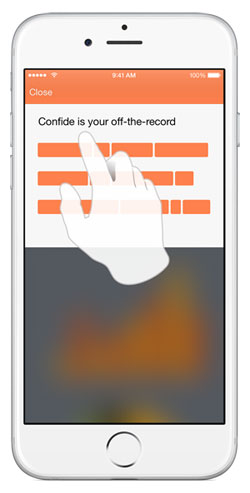By: Jeff Chu, FastCo. Works HPE Matter
A new wave of apps allow for a rarity in the digital age: truly private communication. The new trend for business is using this technology to deliver sensitive material.
The world’s oldest communication system certainly has its flaws: unreliable volume control, occasional kinks in processing, translation problems. But one of the biggest downsides to human speech—no built-in recording technology—is also a strength when it comes to privacy: Without mechanical intervention, the spoken word immediately vanishes.
A host of startups are focusing on this quality to create apps that have come to be known as ephemeral messaging. Snapchat, the ephemeral-messaging company that has garnered the most users and the most hype, basically re-creates the dynamic of human conversation.
“The nature of these apps is that they feel more like conversation,” says Colleen Wormsley of the TMI Agency, a marketing-strategy wing of the youth-focused not-for-profit Do Something. “You send a snap and somebody sends a snap back and it goes away.”
Since launching in 2011, Snapchat has been joined by dozens of other services that offer variations on the same theme, including a raft of products that demonstrate the appeal of temporary messaging for professionals and businesses. All tout one common trait: un-staying power.

Confide, an app that launched in January 2014, also borrows from human conversation. “When you think about sensitive communication, you resort to the spoken word,” says Jon Brod, Confide’s cofounder and president. “Digital communication is the opposite of that. We’re taking this tried-and-true mechanism for communication and bringing it to digital.”
Send an SMS text message in the Confide app, and it will travel, encrypted, across the company’s servers. When the message is read, all but a few words are covered at any moment—you use your finger to move along in the message and uncover words. The method renders it impossible to take a screenshot of a completely uncovered message. (“The screenshot,” says Brod, “is the enemy of the ephemeral.”) Once you click “close” or “reply,” the message disappears forever—from your screen as well as from Confide’s servers. You can’t forward it. You can’t print it. You can’t go back to it.
Brod says Confide has proved especially popular with professionals handling significant confidential issues, from financial deals to HR conversations. So far, the app has been free. An amped-up enterprise version that permits users to upload and send documents, integrate address books, and message groups is launching in the first quarter.
Brod notes that half of Confide’s usage is happening outside the United States, with customers in 130 countries. Nico Sell, cofounder and CEO of Wickr, also sees international demand for ephemeral-messaging. “During the Hong Kong pro-democracy student protests, we saw a 300 percent spike in downloads,” says Sell. “There was an 800 percent spike in South Korea when the government announced a crackdown on messaging.”
Like Confide, Wickr generates a new encryption key for every message. It never holds unencrypted messages on its server, and it deletes messages as soon as they are delivered. Wickr is also adding multimedia features that employ different forms of protection, including a Facebook-compatible photo plug-in called WTF Wickr Timed Feed, which allows users to share photos with up to 151 friends for 24 hours. WTF uses steganography—think of it as the matryoshka doll of data encryption, with a visible outer layer hiding something within. Those lacking authorization will see cat photos on their feeds. Only those with the right key can click through to see the actual image.
Sell sees private messaging as “a universal human right.” Given the growing consumer concern about data privacy, Wickr is working to extend the reach of its patented encryption technology far beyond messaging. “We also plan to secure all the world’s financial transactions in the near future,” says Sell, “and replace the SSL Secure Sockets Layer, the standard security protocol with Wickr.”
In looking for ways to expand its technology, Wickr is sending an unmistakable message in its industry and beyond: Temporary content may provide the path to enduring privacy.
Well-executed apps can breed loyalty, innovation and growth. HP helps companies manage apps that are enjoyable, intuitive and secure, while seamlessly integrating information from cloud-based and traditional applications to multiple device types. For more information, visit our HP application services page.
Source: HPE Matter